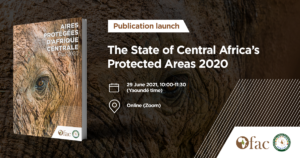[English below]
L’Observatoire des forêts d’Afrique centrale (OFAC) présente un bilan actualisé de l’état des aires protégées dans les dix pays membres de la Commission des Forêts d’Afrique Centrale (COMIFAC).
Rédigé par un groupe d’experts spécialisés dans la conservation en Afrique centrale, avec l’appui financier de l’Organisation des États d’Afrique, Caraïbes et Pacifique (OEACP) et de l’Union européenne (UE) à travers les programmes BIOPAMA et RIOFAC, et la GIZ, l’ouvrage « Aires protégées d’Afrique centrale : État 2020 » fait suite à une première édition publiée en 2015, devenue aujourd’hui la publication phare sur les aires protégées de la sous-région.
Rejoignez-nous le 29 juin 2021 pour le lancement de cette publication. L’interprétation simultanée en anglais et en français sera disponible. L’inscription est obligatoire.
[EN] The Central African Forests Observatory (OFAC) presents an updated assessment of the state of protected areas in the ten member countries of the Central African Forests Commission (COMIFAC).
Drafted by a group of experts specializing in conservation in Central Africa, with the financial support of the Organisation of African, Caribbean and Pacific States (OACPS) and the European Union (EU) through BIOPAMA and RIOFAC programmes, and GIZ, the publication “Protected Areas of Central Africa: State 2020” follows a first edition published in 2015, which has now become the flagship publication on protected areas in the sub-region.
Join us on 29 June 2021 for the launch of this publication. Interpretation English-French will be available. Registration is compulsory.
TAGS:
Related News
-
- Action component
- Assessment tools & their application
- Capacity Development
- Observatories
New Publication: Exploring the impact of grants in Eastern and Southern Africa
-
- Action component
- Data and information
- Observatories
- Planning and decision support
Results and lessons learned from grant implementation
-
- Observatories
Regional observatories in Africa, Caribbean and Pacific in support of the Global Biodiversity Framework implementation
-
- Observatories
The Ministry of the Environment of Côte d’Ivoire invited to the first African Protected Areas Congress
-
- Assessment tools & their application
- Observatories
The Network of Coaches for effective management of protected areas launched
-
- Observatories
Request For Tenders: Consultancy To Develop A Sustainablility Plan For SPREP’s Regional Programme Of Support For Protected Areas
-
- Capacity Development
- Observatories
Training to assist Pacific island countries fulfil management effectiveness element of protected area reporting obligations
-
- Observatories
Crop wild relative conservation in protected areas in Southern Africa
-
- Data and information
- Observatories
Data inventorying exercise to support the Intergovernmental Authority on Development
-
- Observatories
Closing the gap: Conservation Trust Funds
-
- Assessment tools & their application
- Observatories
Atelier de recyclage des coaches sur l’outil IMET
-
- Observatories
Official launch of the Regional Resource Hub for Eastern and Southern Africa
-
- Capacity Development
- Observatories
Enhanced access to information resources, management tools and GIS for the Solomon Island’s protected areas
-
- Capacity Development
- Observatories
Introduction to OECMs
-
- Capacity Development
- Observatories
First-ever protected area management effectiveness assessment conducted for the Barbados Marine Reserve
-
- Observatories
JOIN US on the Global Landscapes Forum Biodiversity Digital Conference
-
- Observatories
Latin America and the Caribbean celebrate protected areas
-
- Observatories
Closing the gap: Payment for Ecosystem Services
-
- Observatories
East Africa learning series on communities combatting Illegal Wildlife Trade
-
- Observatories
Establishing and Managing Effective Transfrontier (Transboundary) Conservation Areas Networks

next

prev
This website uses cookies so that we can provide you with the best user experience possible. Cookie information is stored in your browser and performs functions such as recognising you when you return to our website and helping our team to understand which sections of the website you find most interesting and useful.
Strictly Necessary Cookie should be enabled at all times so that we can save your preferences for cookie settings.
If you disable this cookie, we will not be able to save your preferences. This means that every time you visit this website you will need to enable or disable cookies again.





